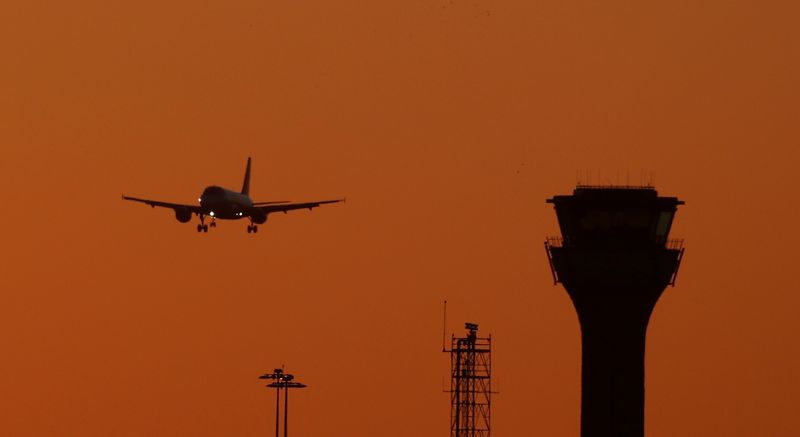Airlines call for emissions help in long-haul to net-zero
2023.06.06 21:21

© Reuters. A passenger plane approaches to land at London Luton Airport, Luton, Britain, January 7, 2018. REUTERS/Peter Cziborra
2/2
By Tim Hepher, Joanna Plucinska and Aditi Shah
ISTANBUL (Reuters) – Global airlines called on Tuesday for broad co-operation to reach “very tough” emission targets and pledged to release interim climate targets next year as the industry aims for a goal of net-zero by 2050.
Aviation, which produces around 2% of the world’s emissions, is considered one of the hardest sectors to decarbonise and the International Air Transport Association (IATA), grouping 300 airlines and representing about 80% of global traffic, said governments, planemakers and regulators must all help.
“We are totally committed to achieving our net zero targets in 2050,” IATA Director General Willie Walsh said at the end of a three-day summit in Istanbul.
“Everybody’s going to have to play their part,” Walsh told a news conference, listing players from governments to planemakers and airports who would have to “raise the bar to work with us to ensure that we can achieve what is an absolute critical goal.”
IATA’s annual meeting also brought stark evidence of a consumer recovery as many airlines voiced interest in ordering new jets to lock in scarce production slots and meet higher-than-expected demand with modern fleets.
Environmental groups say such rapid growth is at odds with the industry’s commitments on emissions, but suppliers say the most recent available jetliners provide the most efficient starting point to take advantage of alternative new fuels.
‘WE’RE SERIOUS’
Pressure is growing on aviation to limit carbon emissions amid low supplies of Sustainable Aviation Fuel, currently accounting for only 0.1% of airline consumption.
Airlines are relying for 62% of their emissions reduction target on the fuel, which is currently between two to four times more expensive than kerosene.
But they oppose EU-style mandates and are calling for output incentives like those introduced by the United States.
“It’s hard to take IATA’s environmental targets seriously when they have a track record of criticizing … policies that will enable clean technologies like the EU’s SAF mandate,” Jo Dardenne of environmental group Transport and Environment said.
Tim Clark, president of Dubai’s Emirates, which recently announced a $200-million aviation sustainability fund, insisted the industry was taking commitments seriously.
“We’re serious, we’re putting money into it. We’re not technologists. We will operate our fleet as best, as efficiently as we can,” he told reporters.
But Clark, whose airline will host the next IATA meeting in Dubai next June, warned other carriers against complacency.
“We need to do something more than moan and groan and say ‘it’s not fair, we can only do what we are doing’,” Clark said.
Walsh said airlines were not afraid to confront the fact that their share of total emissions will rise as other industries with fewer technological hurdles decarbonise.
“It’s not about moaning. It’s about the reality … it is not good enough for everybody else to join us and say yes, we agree. They need to join us and say yes, we agree and here’s what we’re going to do.”
But Walsh hinted airlines needed more time to reach consensus on interim targets, after their emissions pledge in 2021 was clouded by disagreements seen as an echo of wider climate talks.
“Different parts of the world are moving at different paces and for us, representing global airlines, we’ve got to factor all of that into account.”
One thing airlines agreed on was frustration at aircraft delays, which have disrupted their schedules, with CEOs asking IATA to lobby planemakers.
In practice, a senior aircraft industry source told Reuters, airlines with the biggest order books and clout would be able to cut the best deals and shortest additional waiting times.








